Catalan referendum: violence is never the answer, but politicians on both sides are getting it wrong
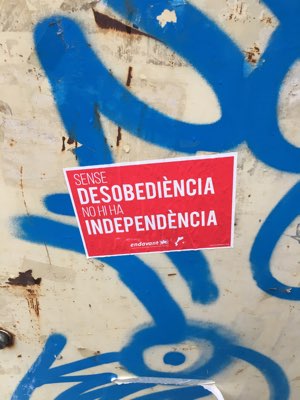
I’ve spent the last three days in Barcelona, observing the 1st October independence referendum, not in any sort of official capacity, but as an interested politics nerd. Political tourism if you like. After my fascinating trip to Scotland prior to the independence referendum there in 2014, it was obvious that seeing Catalonia’s referendum first hand was going to be a fascinating experience. So it proved, and this blog entry tries to sum up my impressions – both of how all this felt on the ground, and how this relates to the wider political context. All my tweets about the issue can be found here.
Before I get started here, two caveats: this issue is so polarised that there is no way any article can please everyone. If you disagree, please do so in a civilised manner in the comments, or on Twitter, but – understandably – that criticism will come. Second, the referendum story is so long and multifaceted that no single blog post can do it justice – I am going to have to skip nuance in some places here. If there are other things I ought to add to give that context likewise leave them in comments.
So anyway, here goes.
The weeks running up to the referendum, and the immediate aftermath, have been a monstrous blame game. The public statements from politicians and commentators have generally fallen in behind the two camps. I am going to try to avoid this sort of blaming.
Take the question of whether the Catalan Referendum yesterday was illegal. Yes, it was, according to the Spanish constitution. Was the Guardia Civil shooting rubber bullets illegal? Yes, that was too, according to a 2013 Catalan law that banned rubber bullets. Websites about the referendum were shut down by the Spanish government – is doing that even legal? The electoral roll used yesterday was not the most up to date one, as the Catalans were not allowed to make use of the most recent register – that is not OK for a democratic vote. The Catalan Parliament did not follow its own procedures to pass the law on 6th September to hold the poll.
Argue about this all you like, but neither side is in the clear about the legality (or not) of what happened yesterday. That politicians in a mature democracy are not capable of managing to hold a legal referendum is ridiculous. Yes, doing so might need the Spanish Constitution to be changed, but that 1978 document should not be considered some sort of legal trump card behind which Rajoy can hide.
The next question: was the referendum democratic? This too it is open to question. That more than 2 million people braved violence to go to the polling stations to vote was extraordinary, and showed considerable commitment from those in favour of independence. But this referendum – in terms of its measures against fraud (problems with the register as mentioned, plus allowing people to vote in other polling stations if their station was closed or ballot boxes seized) this was a highly questionable vote. Everything at the polling stations I visited was as well organised is it could be, bearing in mind the circumstances, but those circumstances were not those to allow calm contemplation.
There was no real No campaign to speak of, and Reporters Without Borders criticised the reporting environment for journalists. The determination of the Catalans to actually vote was mixed up with the demand for independence itself – and this is why the result was so skewed – 90% Yes, but on a 42% turnout. Those opposed to independence stayed at home. Opponents of independence could have voted, pro-independence people told me, and I suppose this is true, but legitimating the referendum legitimated the call for independence in some way (the two were not separate), so I understand their reticence.
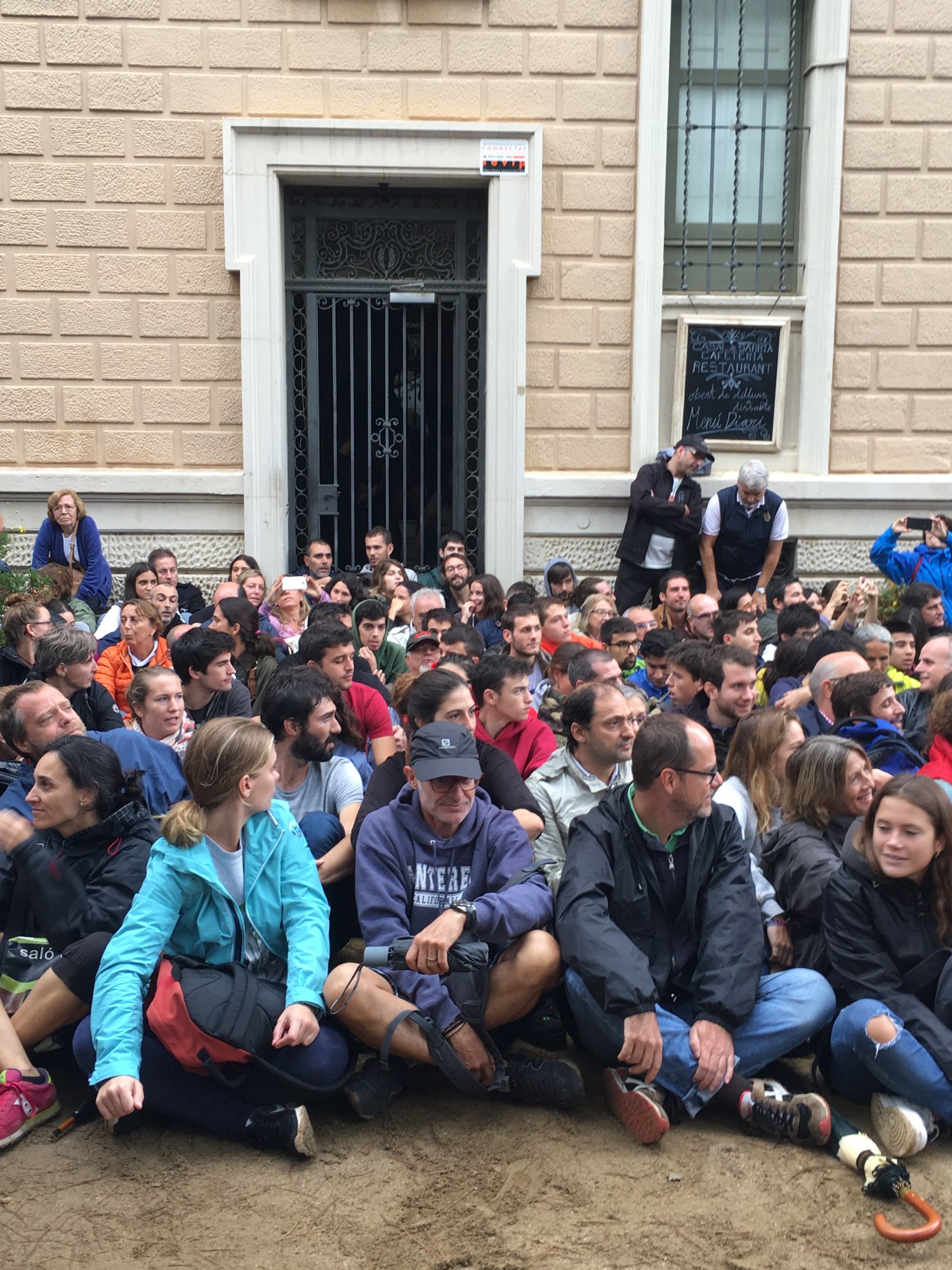
Defending the Centre Cívic Casal de Sarrià
Having said all that, in some way this was an extraordinary democratic moment – seeing Catalans of all ages self organise to defend the polling station at Centre Cívic Casal de Sarrià when there was rumour of a possible police raid is one of the most extraordinary political acts I have even experienced first hand.
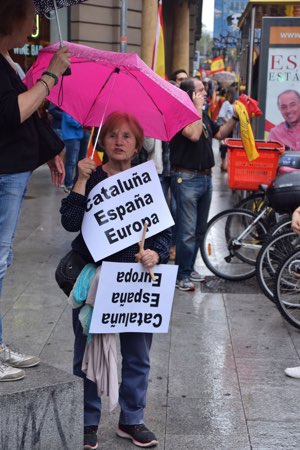
Anti Independence Protestor
The determination to vote if anything burns harder than the determination for independence, and it most definitely is more widespread. “We would vote in a legal referendum” two anti-independence old friends of mine said, “and we want a legal referendum.” Those people did not vote yesterday. I even chanced upon an anti-independence referendum the day before the poll in Via Laietana and even that was festive and peaceful.
All of this means that Mariano Rajoy’s decision to be tough on referendum day itself was a ridiculous move, for it meant he lost any moral high ground in the eyes of the those outside Spain. Using brutal force against your own people in these circumstances is clearly wrong. Yes, that might shore up his support within the Partido Popular, but ultimately this was an incorrect call. Violence is never the answer in these circumstances, and here more than 900 were injured, and some of the footage is horrid to watch.
As well as its moral repugnance, I fail to see what sending in the Guardia Civil actually achieved – the Catalan Government stated that 319 of the 2315 polling stations were closed by police, meaning in the vast majority of polling stations voting still proceeded and was slow but serene. Without the brutal police reaction, and relying only on the actions prior to the referendum day itself, I would rather suspect that turnout would not have been much different, and pretty certainly not over the crucial hurdle of 50% of eligible voters backing independence. In a rather Comical Ali style phrase, Rajoy even stated that there was no independence referendum and commended the serene reaction of the Guardia Civil. There is some serious cognitive dissonance going on in Madrid here, a willful lack of understanding of what is happening on the ground in Catalonia.
Ultimately then I am left with the impression that politicians from both sides have been getting this wrong, ever since the 2010 decision of the Spanish Constitutional Court to overturn parts of the Statute of Autonomy of Catalonia. Since then politicians on both sides have retrenched – on the Spanish side (and in the Partido Popular in particular), politicians have sought refuge in legal rather than political arguments against holding a legal referendum about the future of Catalonia, or finding ways to grant Catalonia more (fiscal) autonomy. On the Catalan side, rejection of the Statute process ultimately pushed the CDC party from a position favouring a referendum to a more outright position favouring independence, a position that hardened so much so as to make it more or less the only purpose of Puigdemont’s administration. This is what makes calls for dialogue now seem so forlorn – the better time for dialogue was a decade ago, but instead the political pressures have been mounting on both sides for years. Neither side has been capable of finding a way to decrease the tensions. So while I can understand the motivations of politicians on each side to behave as they did, their behaviour has ultimately brought the Spanish state to the brink of a constitutional crisis. The approach of politicians on both sides has hence been wrong in my view; they are even more polarised than the population is.

Poster in Gracía
And so back to the street. And the conversations with different people over the past three days – old and young, pro- and anti-independence, locals and international residents looking on. Yes, the international media was right to report on the violence, but aside from that the rest of this referendum was very civic, good natured, genuinely participative. This does not feel like a society on the brink of rupture. Individual Catalans are surely people you can negotiate with, are open to collaboration and compromise. But the deaf ear to Catalans’ concerns in Madrid has hardened the Catalan side, and conversely there is rather little solidarity for the Catalans’ predicament in the rest of Spain.
Within the next 24 48 hours Puigdemont the Catalan Parliament will apparently declare the independence of Catalonia, a decision that would be ill advised in my view, due to the questions that hang over the legitimacy of the referendum. Yet having got this far, can Puigdemont turn back now? And if Catalonia does declare independence, then Rajoy may seek to trigger Article 155 of the Spanish Constitution, resulting in direct rule of Catalonia from Madrid. Such a decision would inflame matters further in Catalonia and would lead to an extraordinary level of protest. But politicians on both sides have escalated matters until now, so why would the coming days be any different?
So are the faultlines and contradictions here. How the failure of a reasonable attempt to secure greater autonomy has pushed politicians of both sides to polarise the debate, leading Spain to the verge of a constitutional crisis out of which there are no simple answers. While in the mean time grass roots politics is amongst the most lively and participative anywhere in Europe.
[Update 3.10.17, 0015]
A friend on Facebook has pointed out an error in the text, namely it is the Catalan Parliament that would vote on a declaration of independence – Puigdemont cannot make that declaration himself. That decision has also been pushed back a day. The text above has been corrected accordingly.
Photos from the referendum weekend
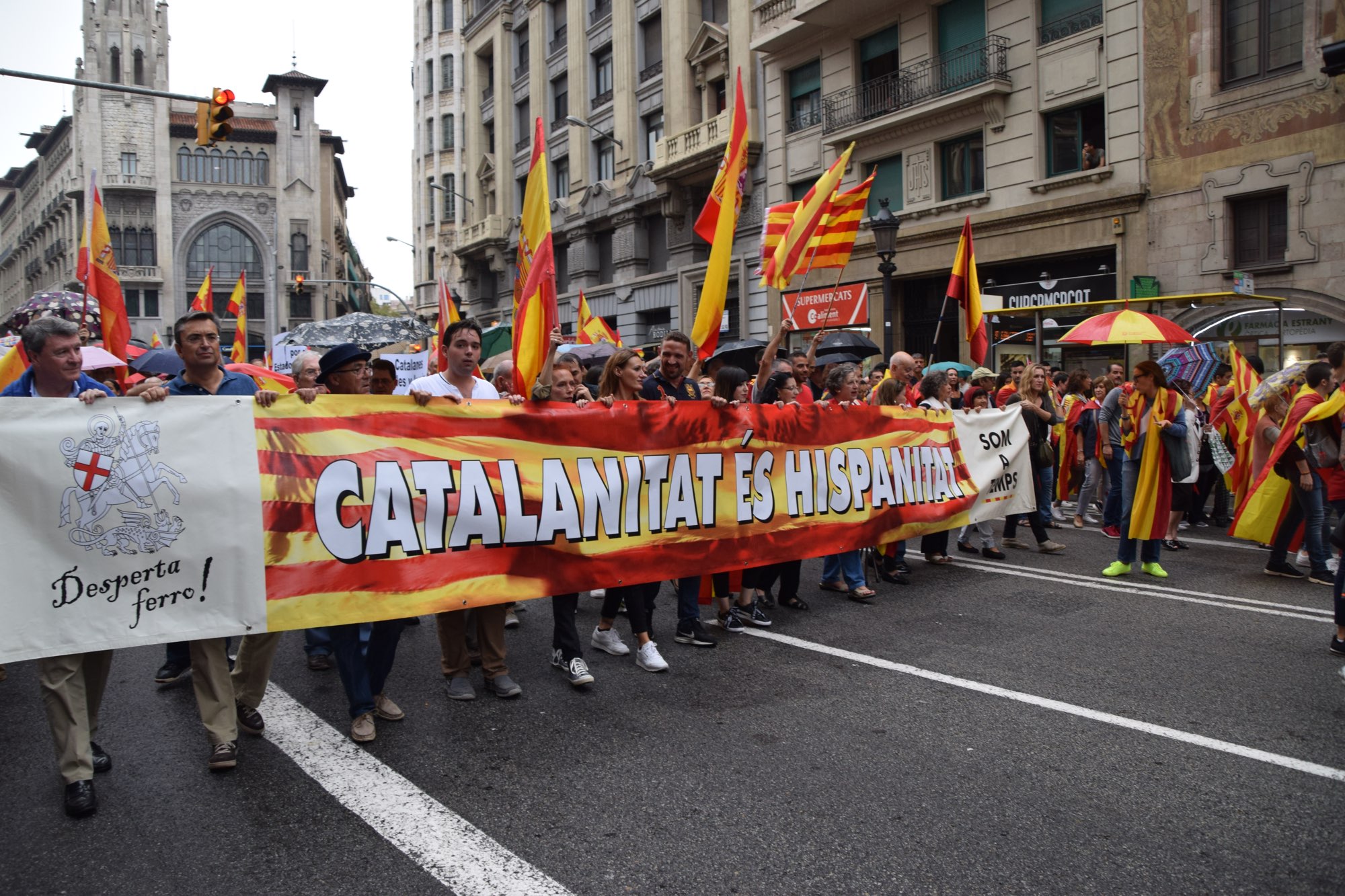
Banner at an anti-independence demo, Saturday 30th Sept

The Pirate Referendum?
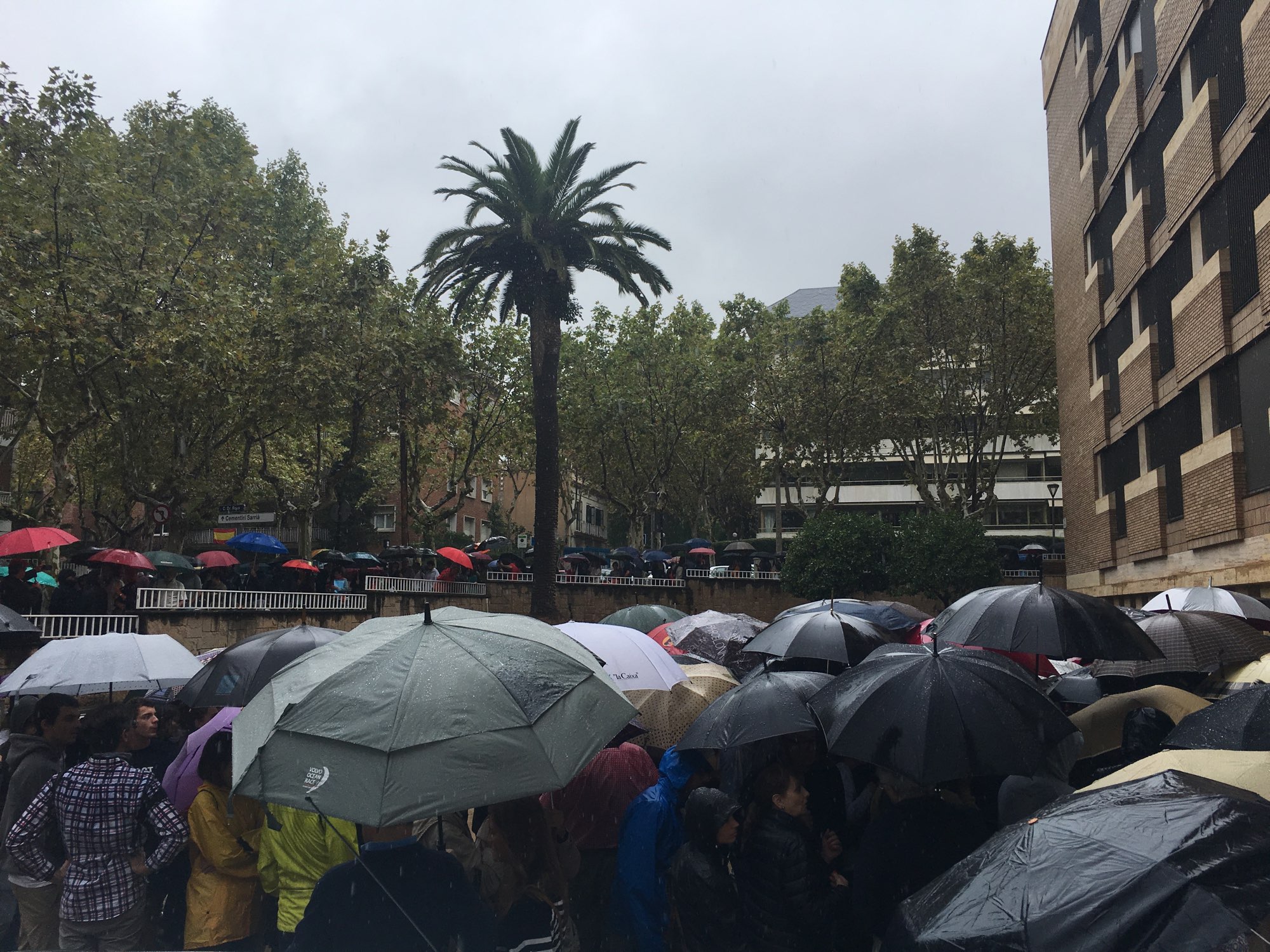
Queues at a polling station in Sarrià in pouring rain, early on 1st October
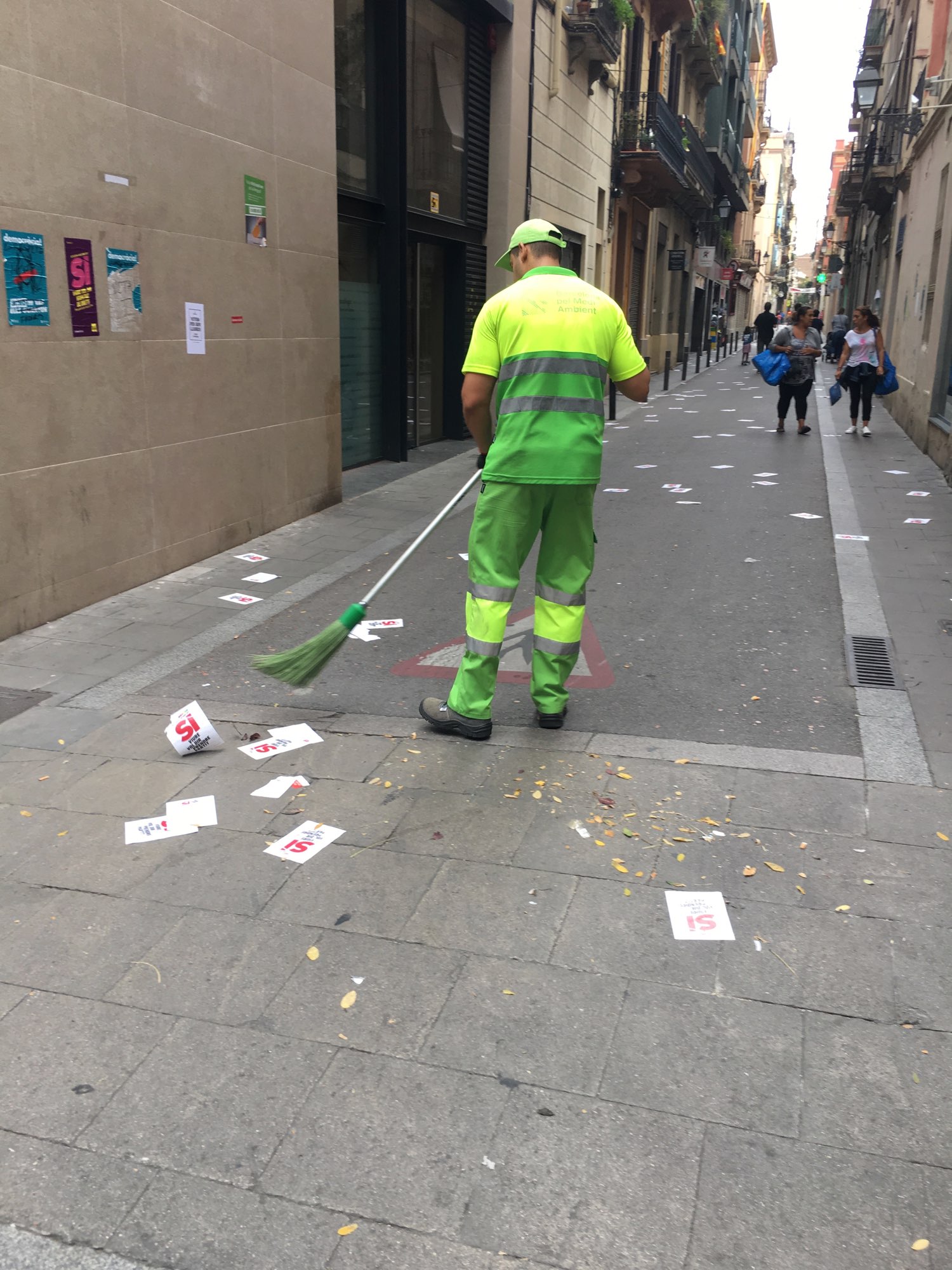
A worker sweeps up Yes leaflets in Gracìa
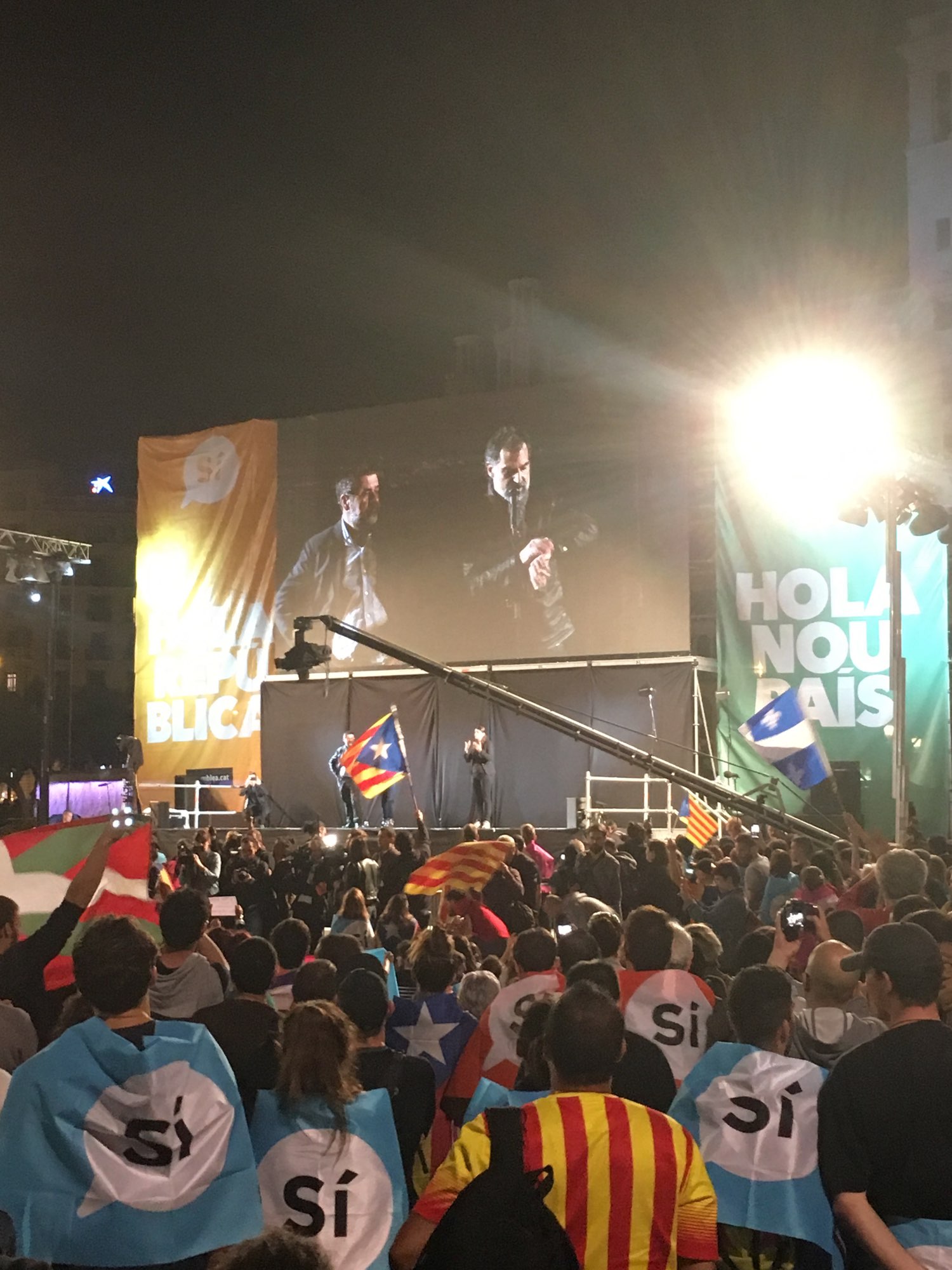
Sunday evening at Placa Catalunya
I deliberately kept it short the other day, but I am back just to say that I could not agree more with Alister’s comment, to which I would add at least two additional precisions: that reform of the Statute of Autonomy was done following due process. Such process consists of approval of a draft by the Catalan parliament, subsequent discussion and approval at the Spanish Parliament, and then ratification by popular vote, in a referendum, in Catalunya. Such procedure was consitutionalized in 1978 to avoid at all costs what had happened in 1931, which is that at the end of Primo de Rivera’s dictatorship, following a municipal election the Catalans declared the Catalan Republic in the Iberian Federation, before the Republic was actually declared and constitutionalized in Spain. The idea was thus to avoid such a scenario again.
It is also important to keep in mind that between 2006 and 2010 (between the approval by referendum and the ruling of the constitutional court), the PP manouvered in Parliament to delay the renewal of the court, by stopping the nomination of new judges when others ended their terms, so as to secure a favorable majority. These manouvers also included an indignant procedure against one of the members, magistrate Perez Tremps, who was removed from the ruling out of an alleged conflict of interest which was pure machination. After a mounting press campaign the final ruling of the court was celebrated by PP and PSOE alike (PSOE, who had voted for the reform in both Parliaments!).
There was only one (small?) problem: the court had actually nullified an agreement between two parliaments that had subsequently been ratified by popular vote. Voices commenting on this rather peculiar situation were responded by very august Spanish constitutionalists with something like -oh, bah, just a detail, when we amend the constitution we just need to reinstate preemptive control by the court and that will be it-. This was the official comment on what was in fact a coup d’état by the same constitutional court, who destroyed the territorial constitution as far as Catalonia is concerned. Catalans have since then been governed with a constitution (the statue is part of the “constitutional block”) that they never voted. This was in fact the beginning of the full blown constitutional crisis we have seen today, and that happened under Mr. Rajoy’s leadership from the very onset, first in the opposition and then in government. That is the reason I was commenting the other day, when I saw the ridiculous statement by the European Commission, where violence was mentioned only in a general statement at the last paragraph as if it were a mere anecdote, that trusting PM Rajoy to solve this crisis is either ill-informed and blind faith, pure cynicism or a very sophisticated form of sarcasm.
That is also the reason the only actual solution would be a negotiated referendum, which the Spanish government has refused to negotiate as many as 17 times -not that the Catalans did not try-.
For this and other reasons, for a sizeable number of Catalans a “negotiated solution within the Spanish constitution” call will fall on deaf ears. Because for them is just an invitation to bang their heads, again, against the same wall.
http://noelmaurer.typepad.com/aab/2017/10/qu%C3%A9-sigue-en-la-madre-patria-.html
You might find these notes by Noel Maurier, a USian blogger I follow interesting. He has a handy cut and keep decision tree on what happens next.
I welcome your impressions of the weekend in Barcelona and your overview of the background to the current impasse. However I think that you have seriously underestimated the impact of the Constitutional Court’s overthrow of the Estatut in 2010. The implications of that decision and its consequences are the direct antecedents of the current situation. The Estatut was approved in 2006 and was the result of an agreement between the then socialist led government in Catalunya and the then socialist led government in Spain. The reformed Estatut was approved by both parliaments with the only objections coming from the PP, the party of Mariano Rajoy. They took their objections to the Constitutional Court which in 2010 effectively declared the Estatut null and void.
In the context of dialogue this decision very clearly demonstrated that Spain was and is effectively unreformable. Especially in light of what the socialists did, or rather didn’t do. Given that the Constitutional court is dominated by very right wing Spanish nationalists, why didn’t the socialists use their time in government to reform the court? The socialists by omission did nothing then and have done nothing since to defend or promote what was their programme of reform. Since then the socialist party has become even more opposed to reform of the constitution.
This unwillingness of the socialists to even countenance constitutional reform was highlighted in the discussions after the 2015 Spanish general election. This election resulted in a slight majority for left of centre parties. A socialist led government was a real possibility, with the support of Podemos, IU and the two Catalan parties. Such a government would likely have been supported by the Basque nationalist of PNV. Yet the socialists point blank refused to participate as the other parties wanted a commitment to reforming the Spanish constitution and specifically to recognise the right to self-determination, thus allowing for a legal referendum.
However the overwhelming majority of the non Catalan and non Basque MPs – PP, Citizens and the socialists – have repeated that they will not ever consider this.
In this context it is somewhat misleading to infer that both sides to blame. As the saying goes it takes two to tango and the Spanish side doesn’t even want to dance.
Thanks for the comment – additional context is useful!
Dear Jon, I would have literally lots of comments to make, but in the essence there is not much I would actually disagree from your text, which I think it is a fair, honest, and quite well informed account of the situation. However there is one major point: I might have misread or misunderstood -the text is clearly your personal view based on what you witnessed, and this is just my reading of it-, but it is my impression that the major violent intervention by police forces seems to appear in your text to be just an anecdote in the background. You even assert that, all in all, without it the turnout might have been pretty much the same, which is to me debatable. As this would be an endless argument, essentially because it would be hard to find any evidence substantiating any position, and as you text is, above all, serene, far from me to open such debate. I would just say that what we saw yesterday, in particular the violence, is not to be underestimated to understand what is to come. This is simply unacceptable in an European Union member state in such a circumstance, full stop. And it will have deep consequences.
A fair point, Ferran, and as I state in the headline and (admittedly in the middle of the text), trying to solve anything with violence is wrong. It should be condemned in the most categoric terms, and I was not tough enough on that. However every other news report has concerned itself with the violence, so I sought to steer clear of letting that issue dominate my piece.